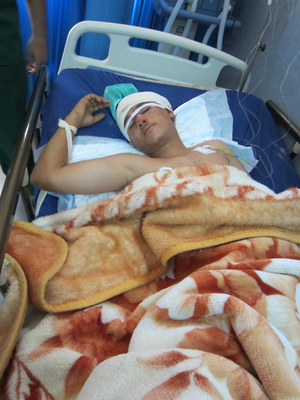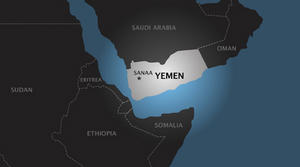Yemen: Security Forces Raiding Aden Hospitals
Forcible Arrests of Alleged Militants Threaten Health Care
Yemeni state security forces are threatening health care in Aden by forcibly removing wounded alleged militants from hospitals, exchanging fire with gunmen seeking to block the arrests, and beating medical staff. One hospital in that southern port city has suspended operations as a result.

Saleh Amhad Abdullah, 16, in intensive care at Aden's al-Nabiq Hospital, two days after being shot in the head on October 7, 2012, during an exchange of gunfire while he was selling fruit outside the medical center.
Aden security forces describe the patients they have sought to arrest as suspects in serious crimes, including attacks against state security forces or armed robbery. Sources link most if not all of the wounded patients to Herak (“Southern Movement”), a coalition of groups seeking greater autonomy or independence for former South Yemen. Gunmen supporting and protecting the alleged militants have fueled the violence by firing at state security forces on hospital grounds.

“Gunfights in hospitals put patients and medical workers at grave risk and threaten to shut down health care in Aden,” said Letta Tayler, senior Yemen researcher at Human Rights Watch. “Both security forces and their opponents are showing callous indifference to human life.”
Government security forces have entered two hospitals in Aden at least five times in 2012 to arrest alleged militants, without warrants and despite warnings from doctors that the patients required continued hospitalization.
On October 7, 2012, state paramilitary forces allegedly beat hospital guards and shot a 16-year-old fruit vendor in the head during an exchange of gunfire with gunmen trying to block the arrest of two alleged militants being treated for gunshot wounds at Aden’s al-Naqib hospital.
“He had no gun. He was only selling fruit,” one of the teenager’s relatives told Human Rights Watch at the hospital two days later. “He was shot as he ducked to escape the bullets.” The international humanitarian organization Medecins sans Frontieres (MSF) indefinitely suspended operations at its Aden hospital after a similar gunfight on September 27.
The Central Security Forces (CSF), a state paramilitary unit, has played a prominent role in the hospital raids, which took place at al-Naqib and the MSF hospital. CSF is commanded by Yahya Saleh, the nephew of former president Ali Abdullah Saleh, who left office in February after a yearlong uprising. In the October 7 incident at al-Naqib, the CSF carted off a seriously wounded patient from the intensive care unit after pulling out his drainage tubes, two witnesses and a senior hospital official told Human Rights Watch.
For fear of similar attacks, medical officials told Human Rights Watch nearly all hospitals in Aden except al-Naqib now generally refuse to admit politically sensitive patients.
Governor Waheed Rasheed of Aden, in an interview with Human Rights Watch, described the wounded patients as “dangerous militants.”
Local sources say the majority if not all of the patients sought by the authorities were members of Herak. Herak was formed in 2007to obtain more resources for South Yemen, an independent state until unification with the north in 1990. Herak includes many non-violent groups but also armed separatist factions. State security forces have repeatedly used excessive and often deadly force against largely peaceful Herak protests. Since the 2011 uprising and particularly since Saleh left office, armed Herak members have attacked state security forces and other government targets, Yemeni government authorities and independent political observers say.
The Yemeni government is responsible for ensuring the security of hospitals and other medical facilities. Consistent with the United Nations Basic Principles on the Use of Force and Firearms by Law Enforcement Officials, security forces acting in a law enforcement capacity “shall, as far as possible, apply non-violent means before resorting to the use of force and firearms.” Whenever the use of force is unavoidable, security forces shall “[e]xercise restraint in such use and act in proportion to the seriousness of the offence and the legitimate objective to be achieved.”
Patients in hospitals are not immune from lawful arrest. However, they retain their right to health care as provided under international law. The forcible removal of seriously wounded patients from a hospital, placing their lives or health at risk, violates this right.
Human Rights Watch called on Yemeni authorities to take immediate measures to protect patients and medical workers from the excessive use of force and arbitrary arrests by security personnel. Governor Rasheed told Human Rights Watch that the government is committed to protecting patients and medical staff.
The armed men who try to prevent the security forces from making arrests in hospitals are also seriously risking the lives of patients and medical personnel, Human Rights Watch said.
“Whatever their agendas, gunmen should not turn hospitals into shooting galleries,” Tayler said. “At the same time, the government should minimize risks to patients and hospital staff and stop depriving alleged militants of their right to medical treatment.”
Source: Human Rights Watch
- 612 reads
Human Rights
Fostering a More Humane World: The 28th Eurasian Economic Summi

Conscience, Hope, and Action: Keys to Global Peace and Sustainability

Ringing FOWPAL’s Peace Bell for the World:Nobel Peace Prize Laureates’ Visions and Actions

Protecting the World’s Cultural Diversity for a Sustainable Future

Puppet Show I International Friendship Day 2020

